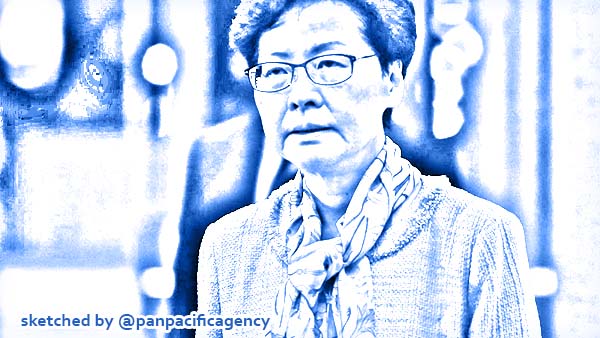Hong Kong leader Carrie Lam vows to work closely with Beijing’s new envoy

Hong Kong leader Carrie Lam has said that a controversial extradition bill, which has spurred weeks of protests in the semi-autonomous Chinese city, "is dead" - but stopped short of a formal withdrawal. (AAP). Sketched by the Pan Pacific Agency.
HONG KONG, Jan 7, 2020, Bloomberg. Hong Kong leader Carrie Lam said she hoped to work “closely” with China’s new top local official to maintain the “one country, two systems” framework that provides the city limited autonomy from Beijing, The Straits Times reported.
Mrs Lam said on Tuesday (Jan 7) that she would meet later this week with Mr Luo Huining, who the Chinese government appointed last Saturday to replace former Hong Kong Liaison Office director Wang Zhimin.
The choice of Mr Luo – a Communist Party cadre known for executing President Xi Jinping’s anti-corruption campaign with little past connection to the largely Cantonese-speaking former British colony – was seen as a signal of Beijing’s intention to restore law and order after more than six months of protest and political unrest.
“I am sure we could work together in strict accordance with the implementation of ‘one country, two systems’ and the Basic Law to ensure the continued stability of Hong Kong,” Mrs Lam told a regular news briefing on the sidelines of her weekly meeting with top advisers.
She called the situation in the financial hub “heart wrenching” and said it was her duty as Chief Executive to set it on the “right track”.
Apart from suppressing violence and restoring order, Mrs Lam said she and her team also have to deal with grim economic challenges this year, with unemployment expected to climb.
Chinese and Hong Kong officials have frequently appeared to be caught off guard by developments over the course of the protests, and communications between Beijing and Hong Kong are mainly conducted through the office.
Mrs Lam also said Hong Kong would increase the monitoring of pneumonia cases following a rise in incidences of the illness amid an outbreak originating in the central mainland city of Wuhan.
The government last Saturday classified its response level to the outbreak as “serious” – the second-highest scale of action in its three-tier system, with the top being an emergency.
Protests that began in June over legislation that would have allowed extradition to China have since morphed into often-violent calls for broader democracy.
The unrest has crippled the city’s economy, particularly its tourism and retail sectors, and is leading some people to eye competing financial centre Singapore.